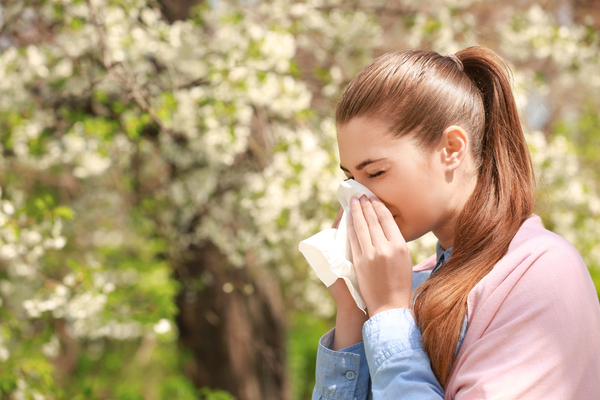Many Americans are scratching their heads as spring allergy season collides with cold season and the COVID-19 pandemic. But knowing what to look for can help you better navigate the often confusing variation of symptoms that is allergy, cold and COVID-19.
“The symptom that overlaps all of these conditions most commonly is a runny or stuffy nose,” says Melanie Carver, chief mission officer at the Asthma and Allergy Foundation of America (AFAA). But that’s not all. A sore throat is also common with colds and COVID-19, and can manifest in allergy symptoms as a result of postnasal drip. A cough, while more likely with COVID-19 or a cold, can also occur in allergen-irritated throats. Even fatigue, though usually linked to COVID-19, can affect cold or allergy-sufferers — especially if nasal congestion is keeping you up at night.
Yahoo Life has broken down how to differentiate between the symptoms, so you can narrow it down more quickly and accurately.
It’s allergies when…
You’re experiencing itchiness. Itchy eyes and nose are trademark seasonal allergy symptoms, but rarely seen with a cold or COVID-19. The biggest red flag that you’re likely dealing with seasonal allergies? Itchiness. Itchy eyes and nose are trademark seasonal allergy symptoms, but rarely seen with a cold or COVID-19, Carver says.
And if you’ve experienced seasonal allergies in the past, chances are that’ll be one of your best indicators that they’re probably coming back. “If you’ve got allergies, you’ve probably done it before,” says Dr. Mark Corbett, president of the American College of Allergy, Asthma and Immunology. “So if you’re doing the same thing you do every year at this time, it’s more likely [allergies].” Carver also notes that seasonal allergy symptoms tend to happen around the same time every year and start abruptly, whereas cold symptoms come on gradually.
But while cold and COVID-19 symptoms can be tricky to treat, fortunately there are simple over the counter remedies you can take to alleviate allergy symptoms. Corbett recommends a nasal steroid spray and oral antihistamines to help you make it through spring.
It’s a cold when…
You have a short-term fever. Colds rarely cause vomiting, nausea, diarrhea or headaches, which are telltale COVID-19 symptoms. Colds also aren’t associated with itchiness — a classic sign of seasonal allergies. “With a cold you’re more likely to have a little bit of temperature,” Corbett says. “You may have chills or body aches that you shouldn’t really have with allergies. And then, typically, a common cold’s only going to last you probably a couple of days, whereas the allergies will drag on.”
But since colds generally don’t have any big red flags to look out for, you’re likely going to lean on the process of elimination. Colds rarely cause vomiting, nausea, diarrhea or headaches, which are telltale COVID-19 symptoms. Colds also aren’t associated with itchiness — a classic sign of seasonal allergies. And since a cold can share some of the milder symptoms of COVID-19 — such as a cough, sore throat and runny nose — the best thing to do is get tested. There isn’t a lab test for the common cold, but you can cross COVID-19 off the list by taking a PCR or rapid test.
It’s COVID-19 when…
You’re experiencing a sudden loss of smell or taste — especially if you don’t have a runny or congested nose — is a classic indicator of COVID-19. COVID-19 is also often accompanied by a persistent fever, whereas allergy symptoms never include a fever.
We’ve spent two years living with COVID-19, and experts are now all too familiar with the unique symptoms of this ubiquitous virus. Sudden loss of smell or taste — especially if you don’t have a runny or congested nose — is a classic indicator of COVID-19. COVID-19 is also often accompanied by a persistent fever, whereas allergy symptoms never include a fever. A fever from a cold tends to be short-lived, if it manifests at all.
And unless you have asthma, trouble breathing is a singular symptom of COVID-19, too. “In people with asthma, allergies and colds can trigger asthma, which leads to shortness of breath,” Carver says. “COVID-19 is the only one associated with shortness of breath on its own.” If you’re feeling off and know that you’ve been exposed to someone with COVID-19, that’s also a pretty good indicator. And whether you have symptoms or not, if you know you’ve been around someone with COVID-19 or think you might have it, it’s a good idea to get tested to give yourself peace of mind and protect those around you.
“My takeaway would be, everybody needs to try to keep some tests available at home, and if there’s any questions just check it,” Corbett says. “Because there really isn’t anything you can go one hundred percent on with symptoms.”
—
Photo Credit: Africa Studio / Shutterstock.com
